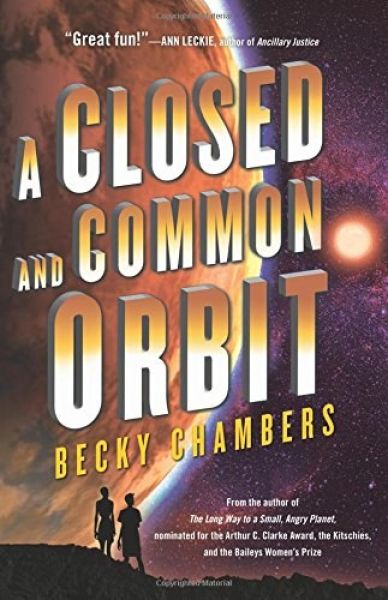Hide Me in a Hollow Sound
A Closed and Common Orbit (Wayfarers, volume 2)
By Becky Chambers

10 Apr, 2017
0 comments
2016’s Hugo nominee A Closed and Common Orbit is the second novel in Becky Chambers’ Wayfarers series.
Forced by circumstance to abandon her life as the mind of a starship, artificial intelligence Lovelace is re-homed in an android body. She adopts a new identity as Sidra. Life in a humanoid shell, tottering precariously on two legs and dealing with complex, unfamiliar social protocols, is challenging.
She meets Pepper, who is eager to help Sidra learn to cope. Unlike many others, Pepper believes that artificial intelligences are people. Why does Pepper have this peculiar and economically inconvenient belief?
The answer to that lies twenty years in the past.
Jane 23 couldn’t have told you what world she called home because Jane 23 had no grasp of the concept planet. Her whole life has been spent inside a vast factory complex, sorting and repairing junk alongside a legion of mass-produced little girls like her. It’s not a very humane system but it is, apparently, cost-effective.
Jane 23 should have lived out her scheduled lifespan of twelve years working diligently under inhumane conditions to improve the bottom line of her unseen Enhanced owners. A deadly mishap on the factory floor kills dozens of Janes, but Jane 23 survives. The blast has opened a hole in the walls of the factory, revealing the existence of the outside world. Once it becomes clear that her robotic minders will kill her for knowing too much, Jane 23 escapes into the world so freshly revealed.
What she finds is a vast, toxic junkyard. Jane 23 must deal with hunger and thirst, as well as packs of genetically engineered feral dogs. Jane 23’s life as a free girl would have ended quickly if she had not stumbled over a badly damaged shuttle craft, a space ship whose motivating intelligence, Owl, is still conscious, communicating, and willing to help a naive young girl.
Decades later, Jane — now Pepper — is eager to repay the debt she owes. Helping AIs in general is easy enough, but so far, freeing Owl has been beyond her. But perhaps with Sidra’s help….
~oOo~
Chambers’ bio mentions that she was “raised (…) as the progeny of an astrobiology educator, an aerospace engineer and an Apollo-era rocket engineer,” which is why I feel it’s OK to be openly boggled that her interstellar rockets are powered, somehow, by algae. I have absolutely no idea how Chambers envisions her system working. Well, at least it’s not powered by implausibly efficient springs.
Luckily for readers everywhere, this isn’t a hard SF novel wherein the absurdities are spot-lit on centre stage. The plot focuses on character, that is, the characters of Lovelace/Sidra and Jane 23/Pepper. Both are appealing; both have a lot in common. Both have been created by (meat) humans to serve and obey. Both are (or have been) subject to draconian regulations that would allow their summary execution were they to be detected. It’s not surprising that Pepper (mass produced clone) empathizes with Sidra (AI in android body) because their lives have been so similar.
The sections where Sidra learns to pilot her new humanoid shell could very easily have meandered into Erotica Written By An Alien Pretending Not To Be Horrified By The Human Body territory. Admittedly, that would have been hilarious, but I think Chambers’ decision not to go in that direction was the right one. Interestingly, the main gender-fluid character in the book isn’t the android (whose nerve-candy ports are at least potentially plug-and-play), but an alien from a species with very very non-human reproductive processes and practices. So let me make some redress for my moans re algae fuel by expressing my sincere appreciation for aliens who reproduce in interesting ways. A tolerance of the unusual that might seem de rigeur for convention-smashing SF authors, but sadly enough, is not. Why, numerous SF authors ignore even the range of behaviors seen in terrestrial organisms (homo sapiens included)!
A Closed and Common Orbit is a more focused, more effective work than the first book in the series, The Long Way to a Small, Angry Planet. This may be because the first book was self-published whereas this one passed through the hands of a professional editor. I prefer to think it’s because Chambers is getting better with practice.
A Closed and Common Orbit is available here (Amazon) and here (Chapters-Indigo).
Until the comments section is repaired, feel free to comment here.
